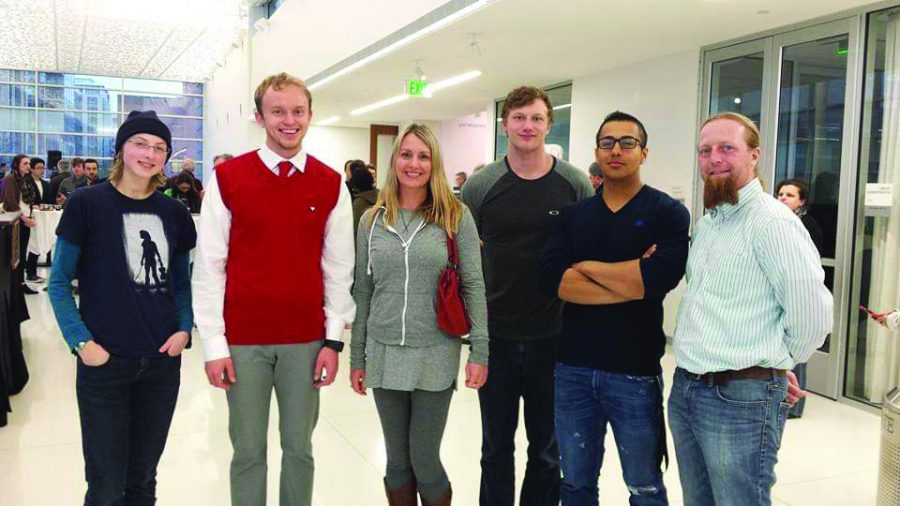Haight Profile “A step toward something else”
Mary Haight along with some students at an art event in Madison.
April 7, 2021
Last week, while I was setting up for what was (in my mind) going to be another disconnected and poor quality, throw away, COVID-19 era Zoom interview; I was thinking “OK, let’s knock this out and keep moving.” I had no idea how wrong I would be.
My subject was Mary Haight, a French instructor at Madison College. However, a generic term like “French instructor” does not do service to the vibrant and engaging Haight, and her adeptness in educating humans, including myself. On the front half of her third decade in education, Haight is not only making it through the malaise of a global pandemic, but she is improving from it. But how? Well, it seems to be the place where the world brought her, and she is embracing it in the same way she has embraced the many other opportunities life has brought her over the years.
Starting with her master’s studies at the University of Wisconsin – Madison (after completing undergrad work at University of Wisconsin – LaCrosse), Haight found herself in one of the most highly rated French programs in the country.
For most, this would be an accomplishment in and of itself, but for Haight this was just one more step in her journey. Her journey into the French language and culture started with a casual interest as an adolescent and strengthened as she got older. As Haight put it, “it wasn’t until college that I realized that I had dreams to travel, I wanted to spend a year abroad,” and so she did, spending her junior year of college in France as a student. Seemingly a dream come true for Haight, it did not go exactly as she imagined it would.
Haight spoke of the difficulties she encountered that year abroad, about how these helped her grow as a person, and gave her an understanding of the importance of compassion. Still passionate about that trip more than 30 years later, Haight speaks with enthusiasm about how it made a positive impact on her life. These experiences in France seemed to be formative in Haight’s belief that an education should help you learn about others, and yourself.
After undergraduate, and rigorous master’s work, Haight decided to take a break during her doctoral candidacy. As any graduate or doctoral student at the University of Wisconsin – Madison (UW) will tell you, there is a heavy focus on research, and Haight wanted to work with people. So, she took a break from her studies. Then, during a job opportunity at a summer study abroad program where she was hired to lead a group of students to France, she once again found her inspiration.
During two summers with the historic World Learning organization in Brattleboro, Vermont, Haight led students through a program called the Summer Abroad Experience. Even though the name sounds generic, World Learning is a highly respected institution that has been shaped by such luminaries as Sargent Shriver and John F. Kennedy. Their mission statement is: “To work globally to enhance the capacity and commitment of individuals, institutions, and communities to create a more sustainable, peaceful, and just world.” For more information about World Learning you can visit: https://www.worldlearninginc.org/.
Haight said, “The universe was telling me, no, you are supposed to be doing French,” and as any student of language will tell you ‘doing’ is an action word.
So, Haight did not proceed through to post-doctoral work (which is generally research based.) Instead, she decided she wanted to work directly with people and use French as a vehicle to help them grow. To actually “do” French. She is by no means an intellectual lightweight though. With an extensive knowledge of French literature and art, Haight has no problem spotting the work of a French master or recognizing quotes from 16th century French philosophers (Montaigne to be exact), but based on the tone of our interview she didn’t seem like the type of person who longs to be in an Ivory Tower. Haight wants to engage with people, and she does.
In keeping with the theme of our interview, Haight’s response to how she came to work at Madison College, also seems to be, well, chance. Shortly after the Summer Abroad program finished, a fulltime position at Madison College opened, and she got the job. It would be easy enough to attribute this to serendipity, but I think a quote from Haight herself serves it better. During the conversation we had about what she does as an instructor she said she helps students take “a step towards something else.”
This phrase lies at the heart of Haight’s philosophy as an instructor. She believes that a Liberal Arts education is not simply a piece of paper, but that it should expand people’s minds, and their potential to live a fuller life. She also believes that struggling can be good because it builds compassion, so she is not going to give anyone a free pass. At the same time, she is possibly the most supportive instructor I have ever met. She is always there to help, as long as you are ready to do the work. Steadfast in her mission to help people grow, at one point in the interview makes the bold claim that study abroad trips should be mandatory for all university level accreditation. It is not hard to see she is serious about her craft and the way she administers it.
As a 23-year veteran at Madison College, Haight has administered the learning of French language and culture to hundreds of students. She helped in the creation of two different study abroad opportunities, currently advises two different certification programs and has chaired the world languages department twice. Through these different roles her focus has never changed; it is always about the students. She really does want to help them grow, learning to be in the world and to engage with that world. It can be difficult to grow but Haight is okay with that. As I looked over my notes, I had the word “help” circled three times, the word “support” circled twice, and the word “compassion” circled, boxed, and asterisked. Honestly, if there was a three-word summary of Haight’s teaching style it would be: difficult, help/support and compassion. I would know because (full disclosure) I was one of her students.
As such I have heard criticisms of Haight, but they are surprisingly few and far between. Of course, there have been students that refer to “Madame Haight” with a subtext sneer that says “geez, you actually have to work to pass this French class, ughh!” You can find this sentiment in almost any educational setting, but I think that if someone said it to her face, she would respond “life is hard, how can I help you with strategies to succeed.”
Beyond the occasional disgruntled student, there is also the fact that Haight is employed by what some people in education refer to as the Golden Goose of two-year colleges. If you look up Mary Haight at jsonline, you can see thar her base salary for 2018 is an eye popping $106,979 (https://projects.jsonline.com/database/2019/7/wisconsin-technical-college-salaries-2019.html). However, when considering Haight’s qualifications, dedication, and tenure at the college, you could just as easily make the argument that she is underpaid.
So, I asked myself, “How could I convince someone I did not have a positive bias for Haight in my interview?” Rate My Professor immediately came to mind. For those who do not know, Rate My Professor is an open-source platform for students to anonymously rate, and often trash, their previous professors and instructors. Even though the site is bias laden in both directions, it is, more often than not, negative bias from students airing grievances. Unsurprisingly, Haight scored a 4.8 out of 5 and only had one negative review (https://www.ratemyprofessors.com/ShowRatings.jsp?tid=1054352). So, if I do have a positive bias towards Haight’s teaching methods, it appears most other people do as well.
This is not to say Haight is not as dynamic as ever though. As our interview crept past the one-hour mark, and the sun started throwing shadows across the grainy Zoom meeting interfaces, Haight stunned me with an almost film noir type reveal.
For the years that I have known Haight, her teaching style has been rooted in a traditional face to face, use it or lose it, methodology. The COVID-19 learning environment has made facilitating that model virtually (no pun intended) impossible. Ever vigilante, Haight is taking a step towards something else indeed. Breaking the traditional mold, she is moving her learning modules online and has reformatted her courses. Not only is she embracing these new learning methodologies, but she is using them to create access and equity in her education model.
Although shocked by Haight’s turn away from traditional French instruction, I am not shocked by her motivation or enthusiasm. Haight’s calling has always been to help people learn and grow, and she seems to count herself in that process. So, after a side-discussion about educational needs in society today it became apparent that the malaise of the COVID-19 era has not slowed Haight down, in fact, she has used it as a slingshot to put herself ahead of the curve.
What was my impression of Haight at the end of the interview, one word: dynamic. As humans we want to be safe and secure. We want to have things in a static state, so we can forecast our own stability. Not Haight. She seems to have learned that life will always be a dynamic endeavor, and she is using that knowledge to expand the minds and possibilities of others. For that I realize that I, as well as countless others, have had a tangible life benefit from Haight’s instruction. For me, that benefit was a deepening respect for other people and cultures that I might have only had a superficial understanding of at the outset; for other students, maybe something else.
Rooted in that spirit of respect, I would sign this piece off with a fitting message. Madame Haight, merci de m’avoir appris l’art de parler la langue française, et un peu plus sur la vie elle-même. And, if you don’t know what that means, go look up one of Haight’s classes at Madison College. She can teach you about that, and a bit about life as well.












